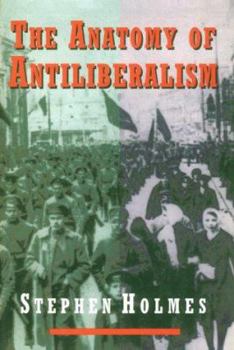The Anatomy of Antiliberalism
Select Format
Select Condition 
Book Overview
Liberal: spoken in a certain tone, heard more and more often lately, it summons up permissiveness, materialism, rootlessness, skepticism, relativism run rampant. How has liberalism, the grand... This description may be from another edition of this product.
Format:Hardcover
Language:English
ISBN:0674031806
ISBN13:9780674031807
Release Date:September 1993
Publisher:Harvard University Press
Length:352 Pages
Weight:1.50 lbs.
Dimensions:1.1" x 6.5" x 9.5"
Customer Reviews
1 rating
Can Liberalism Be Rescued?
Published by Thriftbooks.com User , 17 years ago
When I read the panegyric reviews of this book in the New Republic 13 years ago, I promptly bought it. Few reviews of any book in any venue matched the praise for this book. When it arrived, I was disappointed. Other than its attacks on various nonmarxist illiberal schemes, which are the first-half of the book, and often "straw men," it only offered traditional (classic) liberal principles against the straw-men arguments hoisted against liberalism by conservatives, communitarians, and theocrats. When John Dean's book "Conservatives without Conscience" was reviewed, all of the dragons Dean slays were already in mind. Where had I encountered them? Well, from this book, written 13 years earlier. Dean, it appears, like most traditional conservatives are still classical liberals at heart. The appeal of Barry Goldwater (a Dean mentor) was his devotion to classical liberal ideals. Maybe a tad extreme, but nonetheless appealing. Now, in light of neo-conservatism's assault on classical liberalism (which bears no resemblance to traditional conservatism), suddenly the power of this book becomes all to obvious and deserving of a far wider readership. Classical liberalism has been under assault from its beginnings. It undermined the hegemony of religion. It gave people the right to consent to be governed. It imposed "limits" on what a government could and could not do, infuriating whimsical autocrats. It fostered the autonomy of the individual in making his own choices. It created a system where the exchange of ideas, commodities, and governors was in the common domain, not left to the elite. It insisted on "rights" of certain individuals and functions. It imposed checks-and-balances. It demanded democracy and representative government. From the perspective of history, liberalism not only upset the status quo, but by giving the ruled the right to choose their rulers, and within certain confines, each individual could control his or her life within wide boundaries without encroachment. Liberalism was and remains subversive of all authoritarian schemes, unless the authority comes from the people themselves through democracy and laws. It was and remains positively scandalous. Authority-oriented utopians and master planners will find all these liberal principles entirely too distasteful and inhospitable to stomach. No defense of liberalism can counter every antiliberal notion; such an enterprise, if possible, would require volumes. So, Holmes deliberately omits all Marxist antiliberalism, and in Part I focuses on just seven: Maistre, Schmitt, Strauss, MacIntyre, Lasch, Unger, and Sandel. Strangely, without comment, Holmes ignores Fabianism. The irony is that he has ignored the elephant in the center of the room, while focusing on flies buzzing around on the periphery. The targets he selects he admirably disposes, but the target he ignores is arguably one of the most important. In other words, six of his targets are from the Right, and only one from the Left. N





